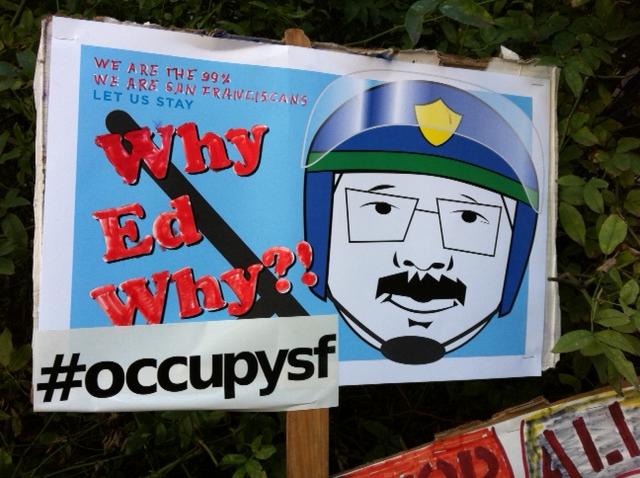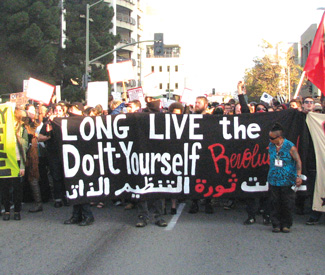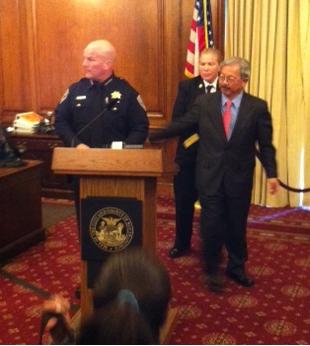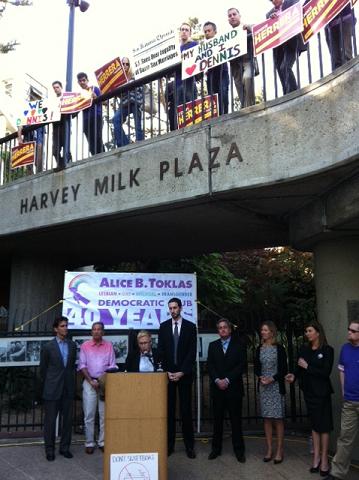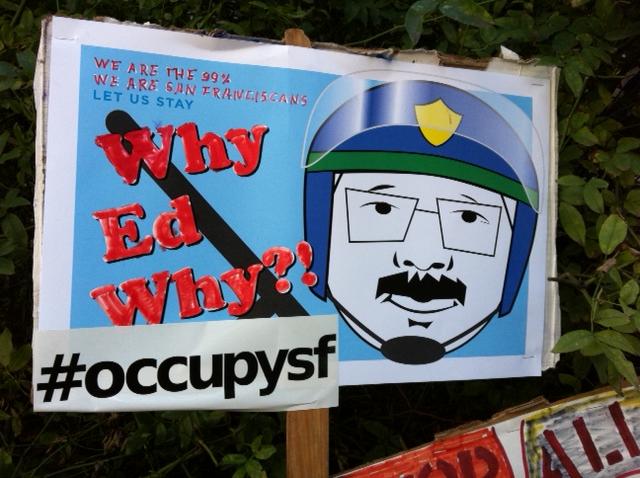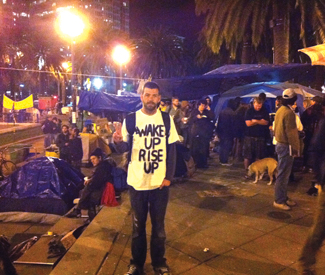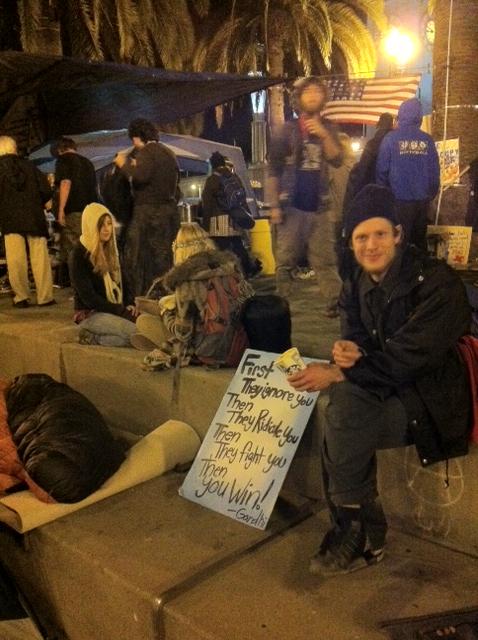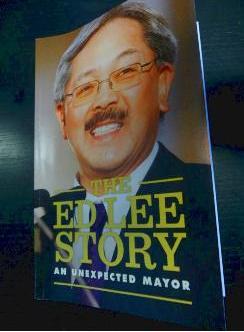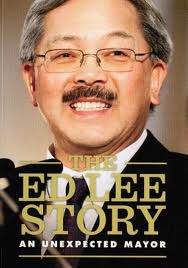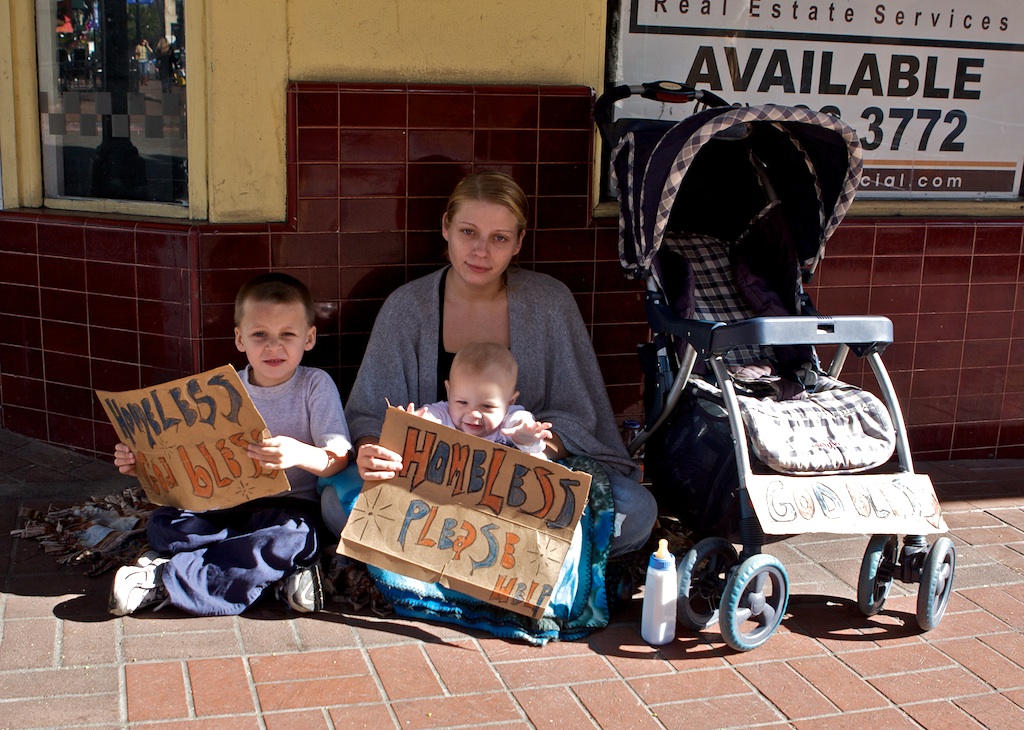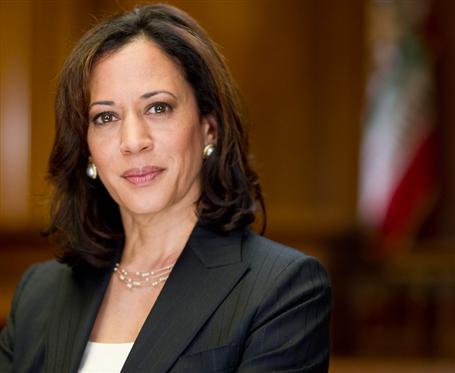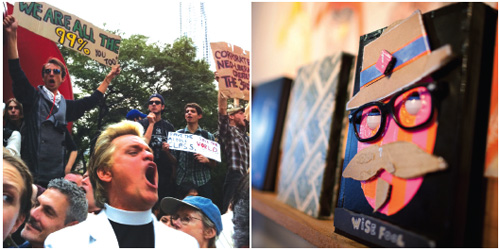With high-profile standoffs between protesters and police last week, Occupy Oakland and OccupySF have attracted international attention and support, helping to galvanize the six-week-old Occupy Wall Street movement.
At press time, Occupy Oakland organizers working in league with local unions were gearing up for a citywide general strike intended to shut down the Port of Oakland and encourage work stoppages and school walkouts on Nov. 2. The occupation at Frank Ogawa Plaza, which had been dismantled by police only days earlier, had begun to reseed, with some 40 tents and a kitchen and first aid area reassembling. Planning meetings for the general strike were being held daily. Nearly 2,000 Occupy Oakland participants voted at an Oct. 26 general assembly to call for the shutdown, following an Oct. 25 clash with law enforcement that left Iraq war veteran Scott Olsen with brain injuries after his skull was fractured by a projectile fired from a line of riot police.
Olsen, 24, who completed two tours of duty before becoming a member of Iraq Veterans Against the War, had progressed beyond critical condition and was expected to eventually recover, yet he continued to have difficulty speaking. At a flagpole near 14th and Broadway, near where Olsen was struck, a shrine was created with his visage illuminated with candlelight and surrounded by flowers and notes wishing his speedy recovery.
Video of an injured Olsen being carried by fellow activists through what looked and sounded like a war zone went viral, putting pressure of Oakland Mayor Jean Quan to retreat from her stance against the encampment. But in San Francisco, Mayor Ed Lee stuck to his position that the OccupySF encampment must come down, threatening another police raid if necessary.
“Any official who would send in the riot police to deal with this camp does not deserve to be mayor of San Francisco,” said Brad Newsham, one of a stream of activists sounding off at an Oct. 31 hearing of the Board of Supervisors’ City Operations and Neighborhood Services Committee convened by Sup. John Avalos to consider a resolution the mayoral candidate had created allowing OccupySF to keep its infrastructure in place.
OccupySF was jolted to a new level of activity Oct. 26 when supporters flooded into the camp in anticipation of a pending police raid. As hundreds practiced forming human blockades to defend the space and news of police whereabouts traveled like wildfire along social network sites, five members of the Board of Supervisors and Sen. Leland Yee appeared in the plaza and voiced their support for the Occupy movement.
“We should allow OccupySF to do what they’re doing,” Sup. David Campos, who was among those to turn out at the plaza and address protesters around 2 a.m., said at the Oct. 31 hearing. “It’s good for San Francisco.”
Campos singled out Lee and Quan for the violent raids, disputing the idea that “somehow it’s okay for us to spend the limited resources we have on these kinds of police actions…I hope we don’t have Mayors Quan and Lee wasting resources that could be better spent elsewhere.”
Amid the ranks of Bay Area occupiers, it was clear that a week marked by fierce government resistance to their organizing had only strengthened their resolve and ignited greater passion for advancing the Bay Area’s role in a nationwide movement that, on the cusp of its seventh week, continued gaining momentum.
Chinatown residents rallying with the Chinese Progressive Association gathered in Portsmouth Square Oct. 30 and marched to the OccupySF encampment in solidarity with the “We are the 99 Percent” movement. On Oct. 29, some 1,000 activists gathered at Ocean Beach to spell out “Tax the 1%” in a human formation.
“For every one of us you repress, 50 join the movement,” said camper Steven Boffo, according to an Occupy Oakland press statement. “Oppressive attacks like the exorbitantly expensive one last night give social movements their wings.”
POLICE BRUTALITY Olsen was not the only protester to be injured by the Oakland Police Department (OPD) and other regional law enforcement agencies recruited for backup on Oct. 25. The conflict began with a 4:30 a.m. police raid of the Occupy Oakland encampment, and ended with a street conflict akin to a war zone just outside the plaza, in which toxic teargas clouded the streets and thunderous booms from flash grenades sent protesters fleeing.
The National Lawyers Guild San Francisco Bay Area Chapter (NLGSF) condemned police actions as excessive and unjustified.
“The police violated just about every provision of their own crowd control policy last night,” said Bobbie Stein, a NLGSF attorney. “Tear gas canisters and flash bang grenades were thrown directly at protesters. … Demonstrators were shot with rubber bullets and shot-filled ‘bean bags.’ All of this is prohibited under the policy that we helped write and under which all OPD officers and commanders are required to be trained.”
There were reports of hand injuries, welts and bruises that appeared to be from rubber bullets, and a head injury stemming from the encampment raid in which officers made 115 arrests, according to a briefing delivered by NLGSF when protesters reconvened in the aftermath.
When the raid occurred, activists erected barricades using wooden pallets, Dumpsters, and an old couch, yet the occupation was crushed in a show of force carried out by hundreds of officers. “The first thing they did was teargas,” explained a protester who gave her name as Maria Jackson. “The teargas created a blackout zone.”
Injuries resulting from the early morning raid paled in comparison with wounds inflicted that night, when Occupy Oakland activists sought to return en masse to Frank Ogawa Plaza, which they had dubbed Oscar Grant Plaza in memory of a 22-year-old police shooting victim.
More than 1,000 marched from the Oakland Public Library around 5 p.m. and continued progressing through the streets for hours, though several standoffs with police sent protesters scattering in mayhem before they reconvened to head back to the plaza, chanting forcefully.
Harun Arsalai, a 29-year-old Muslim organizer originally from Afghanistan, told the Guardian he was taken to the hospital after losing consciousness when several police officers pummeled him on the pavement during a heated standoff at the intersection of Eighth and Washington streets, not long after the march began. A YouTube video shot from a window above the scene shows several officers piling on top of him.
After being released from Highland Hospital to Santa Rita Jail several hours later, Arsalai said several officers stationed inside the jail brought him into an empty cell where they beat him, forced his hand into a toilet, and restrained his neck so that he could not turn to see their faces.
Arsalai — a student, bartender, social worker and organizer who was at Occupy Oakland nearly every day since the encampment started — said he has no way of knowing whether he was specifically targeted. Yet his visibility was high during the march because he was in the front line, helping to carry a banner with writing in English and Arabic. He partially covered his face with a bandana inscribed with an Arabic prayer.
When we was initially arrested, Arsalai said he tried to make police aware that he was having difficulty breathing, but then everything went white. “I didn’t realize teargas was going off right behind me, because I was passed out, unconscious,” he said later.
Upon arriving to jail, Arsalai said he was first placed in a holding cell for a short time which was doused in urine and lacked a toilet. He complained, saying he wanted to speak to a lawyer, but then he said he was taken to a different cell, put in a pain compliance hold, and beaten by several officers. Arsalai weighs about 130 pounds.
“They were standing on my face and telling me not to dare move to look at them before they closed the door and locked it,” he said. “I’m still basically in shock. I’m banged up everywhere. It made me feel less than human.” Sgt. J.D. Nelson, a spokesperson for the Alameda County Sheriff Department, told us: “His allegations are false…We have surveillance areas of all the areas of the jail. We’ve been reviewing all those tapes.” He added, “We’re looking into it, but it’s not an internal investigation at this point. Nobody seemed to remember this guy, so it’s odd.”
THREAT OF A RAID
Across the bay, meanwhile, protesters at the OccupySF encampment continued to live on the psychological edge, not knowing when the hammer would come down.
Avalos’ resolution to allow OccupySF infrastructure to remain in place — which was co-sponsored by Sups. Eric Mar, Campos, and Jane Kim — was approved by the committee and sent to the full board for consideration on Nov. 1, after Guardian press time.
“It is something I am wholeheartedly supporting because it is an expression of great frustration and concern about the economic system,” Avalos said. “We need to speak with a greater voice about changing our economic system so it works for the many and not just the few.”
But Avalos noted his frustration that Lee and the police had raided the camp twice and were threatening to do so again, something the mayoral candidate has sought to mediate since Oct. 5. The city should learn from Oakland that using police force to stop the movement only makes it stronger, Avalos said.
“If we were to try to stop it from happening, it would just encourage more people to take part in it,” he said, noting that more midnight raids are dangerous for both police and protesters. “We have to figure out as a city how we’re going to facilitate, encourage, and accommodate this movement.”
With a second police raid fresh in memory and the threat of a third looming, protester Philip Oje, 26, said the numbers in the camp had swelled. “It’s a microcosm of society and we have to work through all kinds of issues, which we’ve been doing as a group,” he said.
Oje spoke with the Guardian on Oct. 25, hours after the raid on Occupy Oakland. The SFPD had just circulated memos warning OccupySF inhabitants: “You are subject to arrest.” But rather than backing down, OccupySF rented four porta-potties — what many called “occu-potties” — that arrived that afternoon.
“Last night, because of what was happening in Oakland, I thought it would happen here as well,” Oje said. “Personally, I feel like police action is imminent.”
Oje said his personal strategy was to place his body between police and the medical tent to try to salvage that critical resource. “It’s about peace and nonviolence and it’s hard when we have people of lots of different backgrounds,” he said. “So we have to practice rational responses. We need to know what to do when the tear gas comes and the rubber bullets start flying.”
As the evening of Oct. 26 wore on, however, the camp experienced no teargas, projectiles, or physical force — only an outpouring of support from local labor leaders, activists, and elected officials.
By 4:30 am, some 500 were still gathered when OccupySF organizer Ryan Andreola announced, “We just got a report from an official police statement that the raid has been called off because there were not enough police for the number of people here.” The crowd erupted in applause.
The following day, a different story emerged from City Hall. Mayor Lee and Police Chief Greg Suhr offered shifting explanations for the massing of SFPD troops in riot gear, which protesters tracked by sending motorists to keep tabs on them and by communicating via Twitter.
“There were that many police amassed last Wednesday, there will be that many police amassed next Wednesday,” Suhr said. “Wednesday is a standard training day for the Police Department.”
But when reporters expressed skepticism — many were aware of last-minute changes in police staffing schedules and notices issued to neighboring businesses warning of police activity — Suhr said police were preparing to either assist in Oakland, where occupiers had planned to reconverge at the plaza for a general assembly, or deal with trouble from OccupySF.
Lee also raised the concern that violent agitators might come to San Francisco. “They had to get ready for what they saw in downtown Oakland. They had to get ready for hundreds of people coming to San Francisco, either walking over the bridge or coming through the BART system. So they were trying to get ready for that particular activity because we didn’t know what was going to happen.”
BART stations nearby the Oakland and San Francisco encampments were shuttered for some time that evening, presumably to prevent Oakland supporters from joining the ranks of the OccupySF protesters facing a possible police raid. BART did not respond to inquiries as to who made the decision to close those stations or why.
“I’ve always asked the chief to be ready [to enter the camp],” Lee said at the Oct. 27 press conference. “I’ve been insistent that we have to be ready to enforce our laws so he’s been under that instruction for quite some time. But the tactical decisions are the chief’s responsibilities.”
Yet later in the press conference, after Lee had left the room, Suhr made it clear that the final decision lies with the mayor. “Make no mistake about it, Mayor Lee is in charge of this situation,” Suhr said.
After a series of vague responses to reporters’ questions, Lee stood by his earlier statements that protesters would not be allowed to camp.
“There’s a fine line between occupying public space within your First Amendment rights and sleeping overnight and causing health conditions that we’ve been very concerned about,” Lee said. Asked whether tents would still be allowed if the camp was clean and otherwise compliant, he said, “We’re still saying no tents.”
WORLD WATCHES, AND RESPONDS The Oakland crackdown stirred an international response. Talk show host Keith Olbermann condemned the excessive show of police force in a special broadcast and called for Mayor Quan to either resign or fire Police Chief Howard Jordan, whose interim term began just weeks ago following the departure of Chief Anthony Batts.
Quan, for her part, was thrust into the center of a public relations nightmare upon her return from a trip to Washington, D.C., where she was when the raid was occurring.
“I am deeply saddened about the outcome on Tuesday,” she wrote in a statement released Oct. 27. “It was not what anyone hoped for, ultimately it was my responsibility, and I apologize for what happened. Today I visited Scott Olsen and his parents because I was concerned about his recovery,” she wrote.
Quan added that she had called for an investigation into police use of force, and stated, “I will continue to order a minimal police presence.” But Quan noted in her message that camping was still prohibited overnight, a fundamental conflict that seemed to be leading the city back to square one with regards to the occupiers.
Occupy Wall Street (OWS), the encampment based in Manhattan’s Zucotti Park, voted to send $20,000 to Occupy Oakland in the wake of the police crackdown. Between 500 and 1,000 people also marched through the streets of New York City Oct. 26 in a show of solidarity with the Oakland occupiers. “That was a really big march, especially considering how quickly it came together,” said Joseph Carter, a member of IVAW based in New York. “There was a good sized veterans’ contingent. There’s a lot of outrage and a lot of sadness here in New York related to what happened to Scott.” Donations to IVAW for Olsen’s medical and legal needs were pouring in, Carter added. “We’ve had about 700 donations, and they’re coming from across the country,” he said. “Clearly this has touched a nerve here in America.” In Cairo on Oct. 28, thousands rallying against Egypt’s interim military government marched from Tahrir Square to the U.S. Embassy in a show of support for Occupy Oakland. “We’re following everything minute to minute,” said Gan Golan, an OWS activist. “This entire movement is interconnected through the use of social networking technology.”
BEFORE THE STRIKE
At an Oct. 31 press conference at Telegraph and Broadway streets, an intersection which held historic significance in the 1946 Oakland general strike, Occupy Oakland organizers shared their plans for their Nov. 2 day of action, which they officially titled, ‘Liberate Oakland, Shut Down the One Percent.’ The strike was being called to demonstrate solidarity with the global Occupy movement, to call for an end to police attacks, to defend Oakland schools and libraries, and to resist an economic system that promotes inequality and environmental destruction, activists said.
The idea of holding a general strike had won support from the Oakland Education Association (also known as the Oakland teachers’ union), the International Longshore and Warehouse Union (ILWU), and Oakland’s largest union, Service Employees International Union (SEIU) Local 1021.
“The Oakland General Strike will demonstrate the wide reaching implications of the Occupy Wall Street movement,” according to a statement on the Occupy Oakland website. “The entire world is fed up with the huge disparity of wealth caused by the present system. Now is the time that the people are doing something about it. The Oakland General Strike is a warning shot to the one percent — their wealth only exists because the 99 percent creates it for them.” *
Yael Chanoff contributed to this report.




